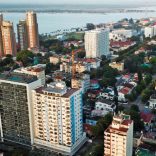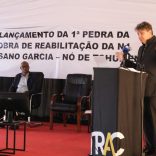Mozambique: Financial Inclusion Strategy launched
Mozambique: Communities prefer illegal loggers, miners who “pay cash”

in file CoM
Communities in forestry exploitation areas of Mozambique prefer to deal with illegal operators, especially the Chinese, because of the late payment of the official 20% exploitation fee, a Civil Society Learning and Training Centre (CESC) study concludes. [You may read the full text, in Portuguese, HERE]
The study commissioned by CESC finds that local communities collaborate with illegal loggers in the exploitation of forest and wildlife resources in northern and central Mozambique.
The arrangement arises from the fact that communities in Niassa and Nampula provinces in the north of the country and Zambézia in the centre have not received the allotted 20% resource exploitation rate since 2019.
CESC consultant Lázaro Mabunda explains that communities prefer to deal with illegal operators because there is no bureaucracy with them. “The communities started to deal with the Chinese who came to buy the logs, and gave them the money immediately,” he says.
Business with anyone who “pays in cash”
There is conflict between the communities and the official forestry operators. “Some will block the concessionaire in the area, because they prefer to negotiate with the Chinese or another illegal operator who pays cash, instead of them waiting for an amount that never arrives,” Mabunda explains.
CESC consultant Dionísio Nombora, co-author of the study, said licensed operators paid the fees for 2019 and 2020 to government entities, but the communities never saw the money.
“As a corollary to this, some tractors are vandalised, and [legal] forestry operators are unable to access areas to exploit resources. The problem is not them, it is with the entity responsible for the release of the 20%,” CESC points out.
How to avoid conflicts?
To avoid conflicts with licensed operators, Lázaro Mabunda recommends that communities be trained in the management of natural resources. “It is necessary to include communities in all forest and wildlife concessions processes in order to generate trust and avoid tensions between communities and operators,” he says.
“There are situations in which the communities put pressure on the authorities in the localities where revenue is due, but the heads of the localities always say that they have not yet received them and do not have any information”, Madumba explains.
Regarding the 2.75% mining tax, Dionísio Nombora says that this amount should also go to areas that suffer the environmental impact of the extractive industry. “It is important to draft a robust document addressing the 2.75% fee management process, including equality issues,” he urges.
For example, says Nombora, “Namanhumbire received 22 million meticais [just over €200,000]. Neighbouring communities see Namanhumbire receiving this, running the risk of Namanhumbir receiving a larger budget than the one that the district receives.”












Leave a Reply
Be the First to Comment!
You must be logged in to post a comment.
You must be logged in to post a comment.